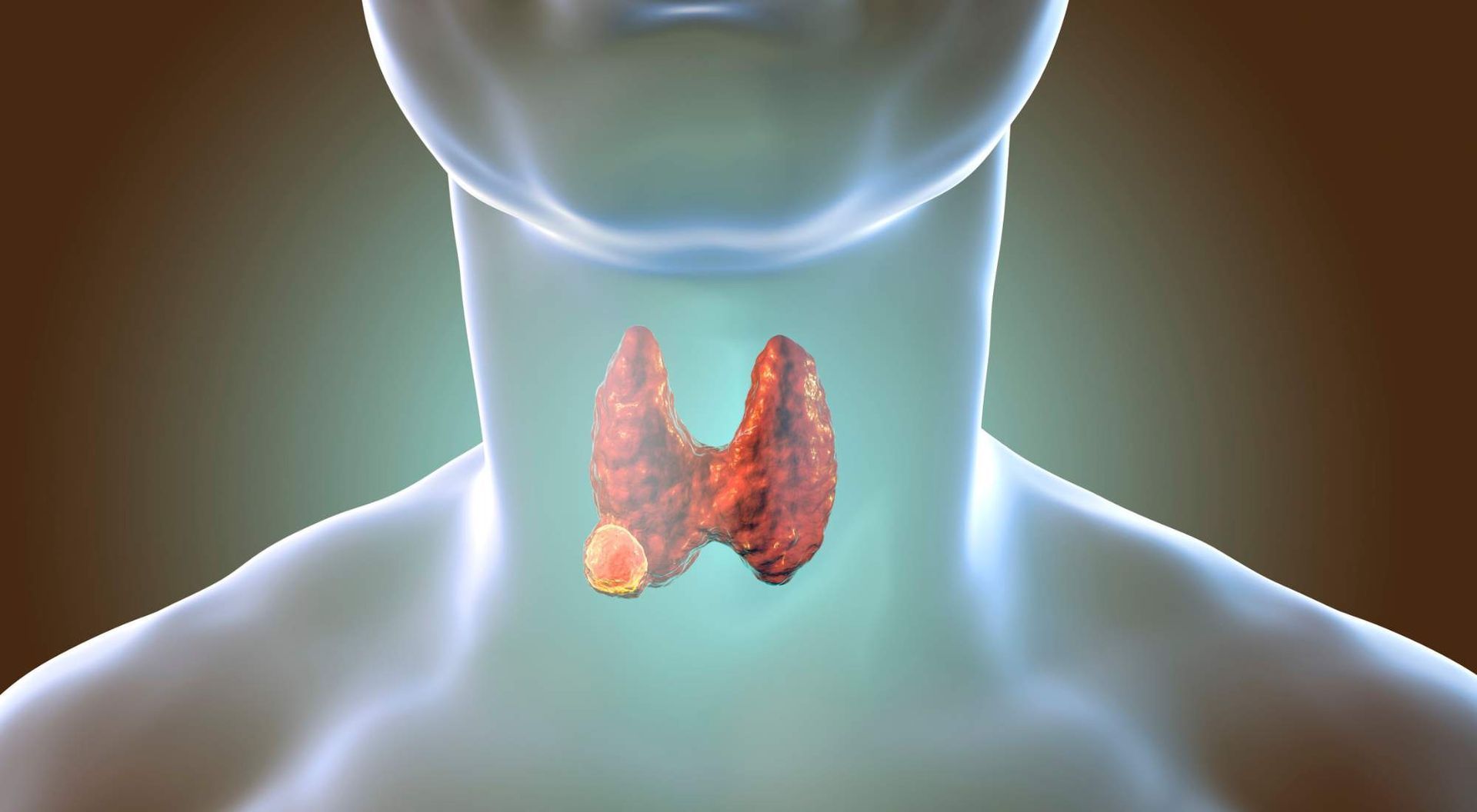Understanding How Thyroid Issues Can Affect Mood and What You Can Do To Manage Mood Swing Symptoms
"The content below is not intended to be a substitute for professional medical advice, diagnosis, or treatment. Always seek the advice of your physician or other qualified health provider with any questions you may have regarding a medical condition."
Recently you’ve noticed a few extra pounds around your waistline, feeling more tired than usual, and just not feeling yourself with frequent mood swings.
Is it just the stress at work and a busy life at home managing the kids’ schedules, or is there possibly something else going on to make you feel this way?
You may be dealing with thyroid dysfunction based on your symptoms, and seeking further evaluation and intervention may help get you back to “feeling normal.”
Read on to investigate thyroid disease, potential symptoms, and how it can affect your mood.
Table of Contents
Can a Thyroid Problem Affect Your Mood?
Millions of Americans are affected by thyroid disease with more than 12% of the US population expected to develop thyroid symptoms within their lifetime.
Additionally, many people who have thyroid dysfunction are not even aware.
If you have thyroid disease, it can absolutely affect your mood — manifesting either anxiety or depressive symptoms as the norm.
In general, the more severe the thyroid disease, the more severe the mood changes may be.
Varying degrees of mood disorder can also be related to which disorder you have,
hyperthyroidism or hypothyroidism.
Do Thyroid Problems Cause Mood Swings?
The thyroid is a fairly small organ, yet it can greatly affect not only your body but your mind, along with your overall feeling of well-being.
Thyroid hormones regulate many processes in your body such as balancing and maintaining your metabolism.
If the delicate balance is not maintained, you may experience adverse symptoms like mood swings.
What Are Mood Swings?
Mood swings are sudden changes in how you are feeling at a particular time.
Sometimes you know what causes your mood, good or bad, but sometimes it’s hard to pinpoint why you are feeling the way you do — or why you experience an abrupt change in mood.
Chemicals in your brain, known as neurotransmitters, are responsible for how you feel, and numerous events in life can be responsible for the rise or fall of these chemicals.
Mood swings are more common in some stages of life and in people with certain medical conditions and diagnoses.
Sudden changes in your mood can be unsettling, and it’s important to remember that everyone can experience mood swings from time to time. However, if they happen frequently or have a negative impact on your life, you should talk with a healthcare provider.
Mood swings or symptoms could include:
- Anxiety
- Depression
- Continual or extreme fatigue affecting mood
- Irritability
- Short temper
If you are suffering from mood swings and think they may be linked to a thyroid disorder,
Healthier U can help identify the problem and design a personalized and holistic plan of care. Call to schedule a free consultation.
5 Potential Causes of Mood Symptoms in Thyroid Patients
Addressing and effectively treating thyroid problems like hypothyroidism or hyperthyroidism generally control the psychological and cognitive symptoms associated with the conditions.
However, if emotional symptoms continue even with effective thyroid treatment, there may be something else at play in addition to the thyroid condition.
Consider the following points of why mood symptoms can be present in a patient with thyroid dysfunction.
#1: Abnormal Hormone Levels
Abnormal levels or rapid changes in hormone levels can greatly affect mood.
Psychological symptoms can be manifested from unstable thyroid hormone levels, especially with hyperthyroidism. It is important to effectively control the thyroid levels to maintain a stable emotional state.
#2: Medication Treatment Challenges
Sometimes mood changes can be an adverse side effect of treatment for other health conditions that have an affect on the thyroid function.
- Medications such as beta blockers that may be utilized to treat high blood pressure, or hypertension, are sometimes prescribed to patients with hyperthyroidism.
- They can help some patients by slowing the heart rate and helping to reduce anxiety.
- Some patients develop adverse symptoms of feeling overly fatigued, having brain-fog, or become depressed.
- Patients who receive steroid therapy with abnormal thyroid hormone levels may experience an increase in depressive symptoms.
- Thyroid patients should try to take their medication at a consistent time of day to prevent fluctuations in hormone levels.
- Missing dosing or scattered medication administration times can negatively affect mood.
Healthier U can assist you with developing an improved approach to managing your thyroid condition including:
- Holistic approach to care
- Nutritional suggestions and guidelines
- Developing healthy lifestyle habits
#3: Changes in Appearance
Unwelcome changes to appearance due to thyroid disease can lead to mood changes.
A thyroid disorder may gradually or abruptly alter a patient’s appearance. These symptoms may include:
- Eye bulge
- Weight gain or loss
- Brittle nails, sometimes with curves or thickening
- Swollen fingertips
- Swollen eyelids, lips, or tongue
- Neck swelling or enlargement
- Hair loss
- Dry skin
- Muscle weakness or trembling hands
#4: Added Stress
Stress on our body can produce physiological symptoms for a variety of reasons.
Patients suffering from a thyroid disorder not only experience stress from the disorder itself, but additional stress can exacerbate or worsen symptoms.
Receiving a diagnosis that you were not anticipating is stressful, and it is not unusual to experience emotional reactions related to a new diagnosis.
In some patients, these emotions can trigger additional trauma. Trauma response symptoms may include:
- Feelings of emotional numbness
- Insomnia
- Difficulty concentrating
- Flashbacks
- Feeling anxious or jumpy
- Feeling frightened
- Feeling alone or isolated
These symptoms can be overwhelming and detrimental to your daily life. If you are experiencing any of these symptoms, discuss them promptly with your doctor to help determine appropriate treatment options.
#5: Other Factors
Before the discovery that your mood swings were related to a medical condition, you may have developed difficulties with personal relationships.
Thankfully, once the conditions are identified and treated, along with symptom stabilization, your emotional state and relationships can improve in the future.
It is important to identify and consider all factors that may be contributing to your symptoms to properly manage your daily life.
Emotional well-being may be related to home or work situations, living arrangements, interpersonal relationships, etc. Consider all factors to maintain the best potential balance.
How Does the Thyroid Cause Mood Swings?
With so many factors that can contribute to mood swings, they can start to feel like a part of everyday life.
There’s a lot you can do to manage mood swings — from changes to your daily routine to medical treatment of your thyroid condition.
Use the following guidelines to consider the possibility of your mood swings being related to thyroid dysfunction.
Hyperthyroidism and Mood Swings
If you have been diagnosed with hyperthyroidism, or overactive thyroid disease, your mood swings or symptoms may include the following:
- Irritability
- Anxiety
- Restlessness
- Unusual or heightened nervousness
- Short temper
- Nervousness
Hypothyroidism and Mood Swings
The thyroid hormones in your body have a direct influence on your heart and circulation, digestion processes, and growth, and also stimulate your nerve cells and brain activity.
With this significant influence on your body, it is not a surprise that malfunction of the thyroid gland can greatly influence your mental health and wellness.
If you have been diagnosed with hypothyroidism, or underactive thyroid disease, your mood swings or symptoms may include the following:
- Depression or sadness
- Unusual fatigue that may range in severity from mild to significant
- Sluggishness
- Poor memory
- Indifference
Studies have proven hypothyroidism and depression to have an established relationship, as those who are not yet diagnosed and not receiving treatment are predisposed to depressive symptoms.
The relationship is strong between thyroid levels as studies have indicated:
- Patients with lower levels of thyroid stimulating hormone, or TSH, are at higher risk of depressive symptoms.
- Patients with depression have an improvement in symptoms when thyroid supplements are prescribed in addition to antidepressants.
How To Manage Mood Swings Related to Thyroid Disease
The mood swings you were recently experiencing were related to a thyroid condition, and now you’re receiving appropriate treatment.
However, the mood swings have not yet completely resolved since the thyroid hormone levels are still not stabilized.
But what can you do to manage the mood swings in the meantime until your treatment reaches an optimal functioning level?
- Engage in routine physical activity.
- Enjoy your favorite music, books, or TV shows.
- Do something creative! Paint, draw, or dance.
- Take a long, relaxing bath.
- Practice relaxation techniques such as yoga or breathing exercises.
- Be mindful of adequate sleep periods.
- Reduce your intake of alcohol, caffeine, or tobacco.
- Determine what triggers irritability; document symptoms in a journal.
- Eat healthy.
HealthierU: Holistic Nutrition and Lifestyle Support To Manage Mood Swings and Other Thyroid Symptoms
Making dietary changes is one of the best ways to return your thyroid to proper working order.
Healthier U begins by conducting a nutrition assessment. Once we confirm that thyroid dysfunction is the cause of your mood swings and other symptoms, you’ll receive a personalized program that addresses your specific needs with a holistic approach to care.
Our lifestyle programs make recommendations for diet, exercise, and whole-food supplementation.
Contact us today to schedule a free complimentary consultation designed to help you get back to your best life with
natural treatment for hypothyroidism.






